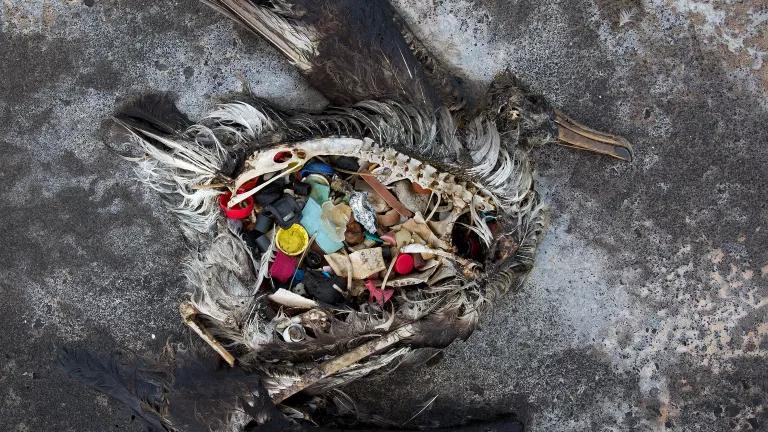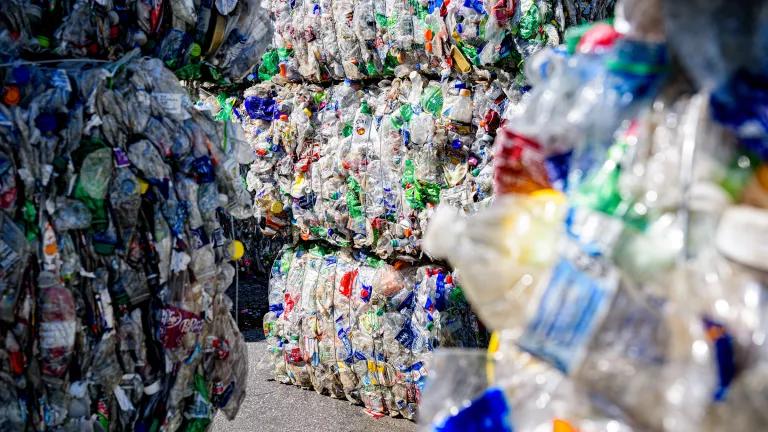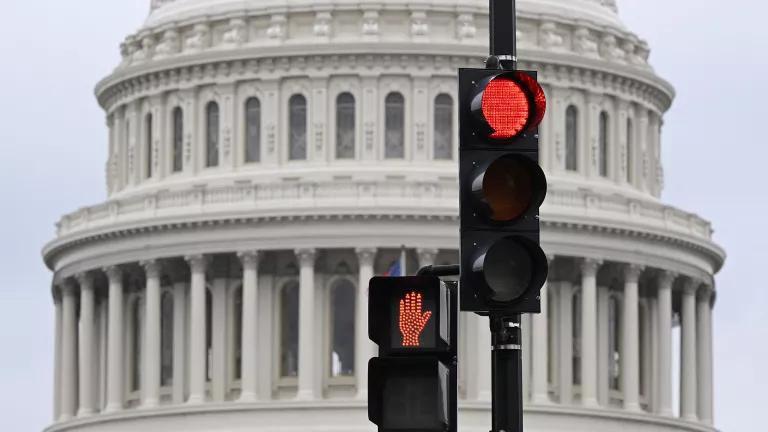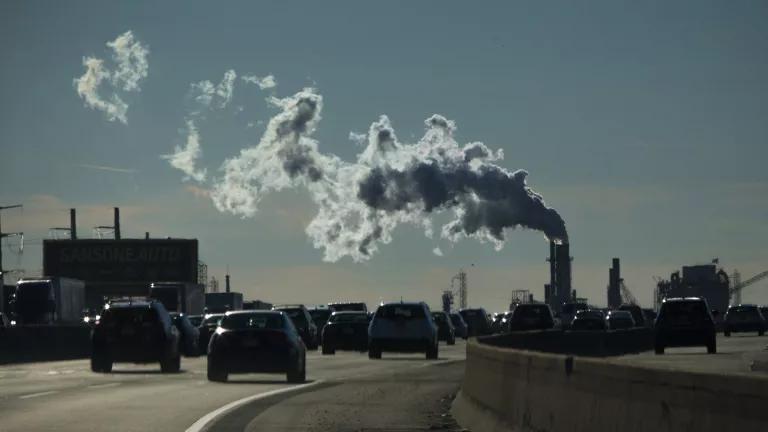Poll: People Want Action on Plastics for Health and Wildlife
New poll results show overwhelming public support for government action to address the plastic crisis, including a strong global plastics treaty.

People gather in front of New York City Hall on April 11, 2024 in support of the Packaging Reduction and Recycling Infrastructure Act, a bill being proposed in the state legislature.
John McCarten/NYC Council Media Unit
As 190 nations prepare to meet in Ottawa for the next round of negotiations on an international treaty to address the global plastic crisis, a new national poll that NRDC released today shows that the public overwhelmingly supports a strong treaty that will reduce production of plastic, eliminate the most toxic forms of plastic and toxic chemical additives, and increase public transparency on the production and use of chemicals in plastic.
The poll shows the widespread concern of Americans across the political spectrum about the impacts of plastic pollution on drinking water quality, health, oceans, and wildlife. The poll’s results are good news for policymakers who are serious about addressing the plastics crisis, including via a strong global treaty. Respondents overwhelmingly supported strong measures, including:
- Reducing plastic production by eliminating unnecessary and avoidable plastic (88 percent support)
- Eliminating toxic chemicals in plastic to protect people’s health (94 percent support)
- Encouraging and supporting alternatives to single-use plastic (90 percent support)
- Ensuring we know what harmful chemicals are used in plastic, and how much (92 percent support)
- Taking action to prevent microplastics from entering our drinking water and food supply (94 percent support)
This widespread recognition of the plastics crisis, and the public’s strong desire for the government to act, is not surprising. Plastic production and the generation of plastic waste have skyrocketed over the past few decades and, absent any limits, is projected to continue escalating dramatically in the years ahead. The combination of so much visible plastic pollution with an increasing awareness of the health hazards posed by plastics throughout their life cycle—such as the presence of microplastics in our bodies—has made addressing the plastics crisis something that almost everyone supports.
Some concerns are basic to just about everyone, with ensuring that there’s enough clean drinking water for themselves and their families being at the top of the list. Given that microplastics and the toxic chemicals they carry pose a very real and immediate threat to the purity of drinking water (a recent investigation found microplastics in 94 percent of U.S. tap water samples) and to people’s health, it’s no wonder that people want to see all levels of government address the problem.
Our poll was nationwide but included an additional focus (called an “oversample”) in Ohio and Pennsylvania, two states where the build-out of the plastics industry is already underway and that have already experienced one aspect of the health threats posed by plastic: the train derailment, subsequent spill, and then burning of vinyl chloride in East Palestine, Ohio (on the border of Pennsylvania) in 2023. Results in these two states were consistent with the overall findings of the poll, including strong support for limiting plastic production and getting toxic chemicals out of plastic.
The poll results demonstrate that the public wants to see the United States take a leadership role in addressing the plastics crisis, including as part of the negotiations for the global plastics treaty. The question is: Will that leadership materialize in time for the upcoming round of negotiations in Ottawa? To date, the U.S. Department of State has largely taken weak and unhelpful positions, serving more as a brake on achieving a meaningful treaty than ensuring that we get one.
The chemical and plastics industries have continued to throw up objections to any treaty provisions that would have a meaningful impact on plastic production, decrease the toxicity of plastics, or increase transparency, while offering approaches—such as “voluntary” reporting on the toxic chemicals in plastic for example—that they know will lead to no real change. So what else is new? The issue isn’t whether the United States has the authority to support a strong treaty; it is whether the political will exists to ignore the chemical industry and their supporters, inside and outside of government, and instead listen to the public and prioritize their interests in clean water and a healthy environment.
In November 2023, 240 organizations sent a letter to President Biden, urging the administration to take a stronger stance, both on the treaty and on domestic plastics policies. The theme of this year’s Earth Day—and the whole month of April—is the plastic pollution crisis. Now would be the ideal time for the administration, Congress, and state legislators to tune in to the public’s concerns and act on their behalf, by recognizing that we can’t recycle our way out of this crisis, rejecting the chemical industry’s so-called “chemical recycling” as the greenwashing of plastic incineration, and instead adopting production limits on plastic, banning most single-use plastics, and getting toxic chemicals out of plastic.

Urge the Biden administration to enact a strong Global Plastics Treaty
Plastic pollution has been linked to everything from cancer in humans to death in wildlife. A strong Global Plastics Treaty could help rid the world of harmful plastics—and as one of the world’s largest producers and consumers of plastic, the United States has a critical role to play.



